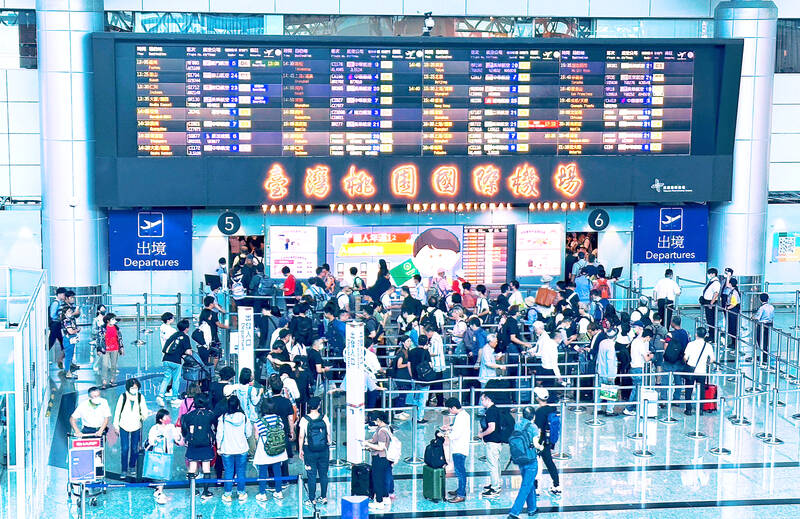Taiwanese travelers heading to certan airports in Japan could from Thursday access a border preclearance service at Taiwan Taoyuan International Airport to facilitate entry into Japan, Taoyuan International Airport Corp (TIAC) announced on Friday.
The measure, which is made possible through the partnership between the airport operator and Japan’s Immigration Services Agency, applies to Taiwanese tourists flying to Hakodate, Asahikawa, Akita, Yamagata, Fukushima, Komatsu, Morioka Hanamaki, Sendai, Takamatsu or Niigata airports from Thursday to Feb. 29.
Those who enter Japan for tourism purposes, family visits, short-term business travel or would stay in Japan for no more than 90 days would be able to access the service, which would close 30 minutes before takeoff.

Photo courtesy of Taoyuan International Airport Corp
Travelers choosing to access the border preclearance service at Taoyuan airport only need to confirm their arrival information at the boarding gates, the TIAC said.
Japanese border control officers would inspect passengers’ passports, take pictures of their faces and collect their fingerprints at the pre-clearance service, it said, adding that passengers could enter Japan soon after the immigration officers there check their passports and complete all entry procedures.
It is to be implemented next month, as the Lunar New Year holiday is the peak time of travel to Japan, TIAC said, adding that more than 6,000 Taiwanese tourists could benefit from the short-term measure.
Prior to this year, Japan’s border preclearance service was available at Taoyuan airport from 2005 to 2009 and was resumed last year with a two-week trial, TIAC said.
This year, the service would extend to one month and apply to flights to the 10 Japanese airports serviced by China Airlines, Starlux Airlines and Tigerair Taiwan, TIAC said.
“As the winter break and Lunar New Year holiday are peak times for outbound travel, we want to remind travelers to arrive at Taoyuan airport 2.5 to 3 hours before the departure of their flights,” the company said. “They should first take out laptops, tablet devices and mobile power banks from their carry-on luggage when they arrive at the security lines,” the comapany said.
“They should also remove water from containers as well as their jackets, hats and waist belts to facilitate the security check process” it added.
The Japan Tourism Agency on Jan. 17 published the results of a survey among international tourists, showing that Taiwan was ranked first in terms off money spent by international tourists in Japan last year.
Taiwanese tourists spent about NT$165.1 billion (US$5.27 billion) in Japan last year, exceeding spending by South Korean and Chinese tourists, the results showed.
Taiwan has signed reciprocal agreements with the US, South Korea, Australia, Italy, Germany, Japan, Singapore and the UK to facilitate the entry of Taiwanese tourists.

Taiwan has received more than US$70 million in royalties as of the end of last year from developing the F-16V jet as countries worldwide purchase or upgrade to this popular model, government and military officials said on Saturday. Taiwan funded the development of the F-16V jet and ended up the sole investor as other countries withdrew from the program. Now the F-16V is increasingly popular and countries must pay Taiwan a percentage in royalties when they purchase new F-16V aircraft or upgrade older F-16 models. The next five years are expected to be the peak for these royalties, with Taiwan potentially earning

STAY IN YOUR LANE: As the US and Israel attack Iran, the ministry has warned China not to overstep by including Taiwanese citizens in its evacuation orders The Ministry of Foreign Affairs (MOFA) yesterday rebuked a statement by China’s embassy in Israel that it would evacuate Taiwanese holders of Chinese travel documents from Israel amid the latter’s escalating conflict with Iran. Tensions have risen across the Middle East in the wake of US and Israeli airstrikes on Iran beginning Saturday. China subsequently issued an evacuation notice for its citizens. In a news release, the Chinese embassy in Israel said holders of “Taiwan compatriot permits (台胞證)” issued to Taiwanese nationals by Chinese authorities for travel to China — could register for evacuation to Egypt. In Taipei, the ministry yesterday said Taiwan

‘LIKE-MINDED PARTNER’: Tako van Popta said it would be inappropriate to delay signing the deal with Taiwan because of China, adding he would promote the issue Canadian senators have stressed Taiwan’s importance for international trade and expressed enthusiasm for ensuring the Taiwan-Canada trade cooperation framework agreement is implemented this year. Representative to Canada Harry Tseng (曾厚仁) in an interview with the Central News Agency (CNA) said he was increasingly uneasy about Ottawa’s delays in signing the agreement, especially as Ottawa has warmed toward Beijing. There are “no negotiations left. Not only [is it] initialed, we have three versions of the text ready: English, French and Mandarin,” Tseng said. “That tells you how close we are to the final signature.” Tseng said that he hoped Canadian Prime Minister Mark Carney

POSITIVE DEVELOPMENT: Japan and the US are expected to hold in-depth discussions on Taiwan-related issues during the meeting next month, Japanese sources said The holding of a Japan-US leaders’ meeting ahead of US President Donald Trump’s visit to China is positive news for Taiwan, former Japan-Taiwan Exchange Association representative Hiroyasu Izumi said yesterday. After the Liberal Democratic Party’s landslide victory in Japan’s House of Representatives election, Japanese Prime Minister Sanae Takaichi is scheduled to visit the US next month, where she is to meet with Trump ahead of the US president’s planned visit to China from March 31 to April 2 for a meeting with Chinese President Xi Jinping (習近平). Japan and the US are expected to hold in-depth discussions on Taiwan-related issues during the